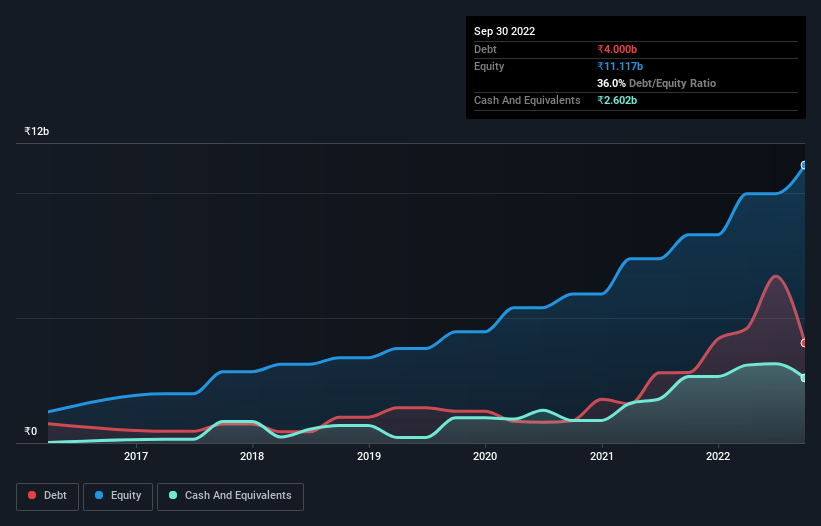- India
- /
- Consumer Durables
- /
- NSEI:DIXON
Does Dixon Technologies (India) (NSE:DIXON) Have A Healthy Balance Sheet?

Warren Buffett famously said, 'Volatility is far from synonymous with risk.' When we think about how risky a company is, we always like to look at its use of debt, since debt overload can lead to ruin. As with many other companies Dixon Technologies (India) Limited (NSE:DIXON) makes use of debt. But should shareholders be worried about its use of debt?
When Is Debt Dangerous?
Debt assists a business until the business has trouble paying it off, either with new capital or with free cash flow. Part and parcel of capitalism is the process of 'creative destruction' where failed businesses are mercilessly liquidated by their bankers. However, a more frequent (but still costly) occurrence is where a company must issue shares at bargain-basement prices, permanently diluting shareholders, just to shore up its balance sheet. By replacing dilution, though, debt can be an extremely good tool for businesses that need capital to invest in growth at high rates of return. The first step when considering a company's debt levels is to consider its cash and debt together.
View our latest analysis for Dixon Technologies (India)
What Is Dixon Technologies (India)'s Debt?
You can click the graphic below for the historical numbers, but it shows that as of September 2022 Dixon Technologies (India) had ₹4.00b of debt, an increase on ₹2.82b, over one year. However, it does have ₹2.60b in cash offsetting this, leading to net debt of about ₹1.40b.

How Healthy Is Dixon Technologies (India)'s Balance Sheet?
Zooming in on the latest balance sheet data, we can see that Dixon Technologies (India) had liabilities of ₹34.1b due within 12 months and liabilities of ₹5.27b due beyond that. On the other hand, it had cash of ₹2.60b and ₹19.4b worth of receivables due within a year. So its liabilities total ₹17.4b more than the combination of its cash and short-term receivables.
Given Dixon Technologies (India) has a market capitalization of ₹216.0b, it's hard to believe these liabilities pose much threat. But there are sufficient liabilities that we would certainly recommend shareholders continue to monitor the balance sheet, going forward. But either way, Dixon Technologies (India) has virtually no net debt, so it's fair to say it does not have a heavy debt load!
We use two main ratios to inform us about debt levels relative to earnings. The first is net debt divided by earnings before interest, tax, depreciation, and amortization (EBITDA), while the second is how many times its earnings before interest and tax (EBIT) covers its interest expense (or its interest cover, for short). This way, we consider both the absolute quantum of the debt, as well as the interest rates paid on it.
While Dixon Technologies (India)'s low debt to EBITDA ratio of 0.31 suggests only modest use of debt, the fact that EBIT only covered the interest expense by 6.8 times last year does give us pause. So we'd recommend keeping a close eye on the impact financing costs are having on the business. In addition to that, we're happy to report that Dixon Technologies (India) has boosted its EBIT by 30%, thus reducing the spectre of future debt repayments. There's no doubt that we learn most about debt from the balance sheet. But it is future earnings, more than anything, that will determine Dixon Technologies (India)'s ability to maintain a healthy balance sheet going forward. So if you want to see what the professionals think, you might find this free report on analyst profit forecasts to be interesting.
Finally, a company can only pay off debt with cold hard cash, not accounting profits. So we always check how much of that EBIT is translated into free cash flow. Over the last three years, Dixon Technologies (India) recorded negative free cash flow, in total. Debt is far more risky for companies with unreliable free cash flow, so shareholders should be hoping that the past expenditure will produce free cash flow in the future.
Our View
Happily, Dixon Technologies (India)'s impressive EBIT growth rate implies it has the upper hand on its debt. But we must concede we find its conversion of EBIT to free cash flow has the opposite effect. Looking at all the aforementioned factors together, it strikes us that Dixon Technologies (India) can handle its debt fairly comfortably. On the plus side, this leverage can boost shareholder returns, but the potential downside is more risk of loss, so it's worth monitoring the balance sheet. When analysing debt levels, the balance sheet is the obvious place to start. However, not all investment risk resides within the balance sheet - far from it. Case in point: We've spotted 1 warning sign for Dixon Technologies (India) you should be aware of.
Of course, if you're the type of investor who prefers buying stocks without the burden of debt, then don't hesitate to discover our exclusive list of net cash growth stocks, today.
If you're looking to trade Dixon Technologies (India), open an account with the lowest-cost platform trusted by professionals, Interactive Brokers.
With clients in over 200 countries and territories, and access to 160 markets, IBKR lets you trade stocks, options, futures, forex, bonds and funds from a single integrated account.
Enjoy no hidden fees, no account minimums, and FX conversion rates as low as 0.03%, far better than what most brokers offer.
Sponsored ContentNew: Manage All Your Stock Portfolios in One Place
We've created the ultimate portfolio companion for stock investors, and it's free.
• Connect an unlimited number of Portfolios and see your total in one currency
• Be alerted to new Warning Signs or Risks via email or mobile
• Track the Fair Value of your stocks
Have feedback on this article? Concerned about the content? Get in touch with us directly. Alternatively, email editorial-team (at) simplywallst.com.
This article by Simply Wall St is general in nature. We provide commentary based on historical data and analyst forecasts only using an unbiased methodology and our articles are not intended to be financial advice. It does not constitute a recommendation to buy or sell any stock, and does not take account of your objectives, or your financial situation. We aim to bring you long-term focused analysis driven by fundamental data. Note that our analysis may not factor in the latest price-sensitive company announcements or qualitative material. Simply Wall St has no position in any stocks mentioned.
About NSEI:DIXON
Dixon Technologies (India)
Engages in the provision of electronic manufacturing services in India and internationally.
Exceptional growth potential with solid track record.
Similar Companies
Market Insights
Community Narratives



